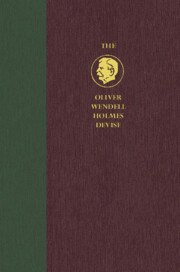Book contents
- The Hughes Court
- The Oliver Wendell Holmes Devise History of the Supreme Court of the United States
- Additional material
- Additional material
- The Hughes Court
- Copyright page
- Contents
- Acknowledgments
- Preface
- Table of Cases
- Introduction
- Part I The Opening Years
- Part II Continuities
- Section A: Administrative Law
- Section B: Civil Liberties and Civil Rights
- Section C: Justiciability
- Chapter 29 Basic Concepts of Justiciability
- Chapter 30 Sovereign Immunity and Political Questions
- Chapter 31 Regulating Access to the National Courts
- Chapter 32 Erie
- Chapter 33 Erie’s Legacy
- Chapter 34 Form and Style in Statutory Interpretation
- Part III New Approaches Begin to Emerge
- Historiographical Essay
- Index
Chapter 30 - Sovereign Immunity and Political Questions
from Section C: Justiciability
Published online by Cambridge University Press: 13 January 2022
- The Hughes Court
- The Oliver Wendell Holmes Devise History of the Supreme Court of the United States
- Additional material
- Additional material
- The Hughes Court
- Copyright page
- Contents
- Acknowledgments
- Preface
- Table of Cases
- Introduction
- Part I The Opening Years
- Part II Continuities
- Section A: Administrative Law
- Section B: Civil Liberties and Civil Rights
- Section C: Justiciability
- Chapter 29 Basic Concepts of Justiciability
- Chapter 30 Sovereign Immunity and Political Questions
- Chapter 31 Regulating Access to the National Courts
- Chapter 32 Erie
- Chapter 33 Erie’s Legacy
- Chapter 34 Form and Style in Statutory Interpretation
- Part III New Approaches Begin to Emerge
- Historiographical Essay
- Index
Summary
Justiciability doctrine also dealt with the amenability of states to suit in the federal courts, an issue the Court addressed in Monaco v. Mississippi, which found a general principle of state sovereign immunity embedded in the Constitution. The Court also continued to limn the controus of the law authotizing suits under limited circumstances against state officers charged with enforcing allegedly unconstitutional state laws. And, in an important and confusing decision the Court invoked standing and political questions rules to avoid deciding whether the proposed Child Labor Amendment had expired because of the lapse of time or asserted procedural irregularities in state ratification processes.
Keywords
- Type
- Chapter
- Information
- The Hughes CourtFrom Progressivism to Pluralism, 1930 to 1941, pp. 784 - 802Publisher: Cambridge University PressPrint publication year: 2022

